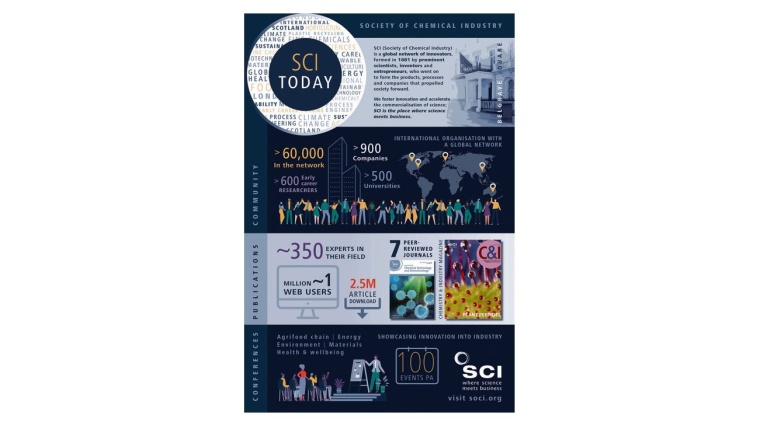Where Science Meets Business
From its inception in 1881, SCI's principal objective has been to further the application of chemistry and related sciences into industry for the public benefit.

In November last year, SCI (Society of Chemical Industry) had the privilege of hosting a debate at COP26 in Glasgow on ‘Combating Climate Change with Chemistry’. We staged a panel discussion of young industrial scientists working globally to address climate change. They included SME representatives from California’s hard-tech start up C-Zero and Sphera in Durham, UK, as well as corporate partners GSK, Unilever and AstraZeneca.
The event coincided with SCI’s 140th year. As a learned society and the place ‘where science meets business’, the debate showcased the unique role of SCI — working as a global innovation hub to support both SMEs and large corporates as they navigate global industry challenges, putting the customer and society first. SCI has truly come full circle — returning to the very reason it was founded and reminding members why collaboration across the international chemical using industries is critical if we are to accelerate the science out of the lab for full scale commercial use — and societal benefit in testing times.
Innovation Is Not New
Chemistry has been at the heart of innovation over the last 200 years, an integral part of the industrial revolution, and a vital supplier of society’s needs. It provided the route to synthetic fibers for clothing and furniture — supplementing the stretched supplies of cotton and wool and developed materials for homes, factories, farms, the growing automotive and aerospace industries. Chemistry related science was the bedrock of the healthcare industry too — from the first soaps and disinfectants, through to early drugs and the sophisticated molecule we now use for therapy and disease prevention. This year, SCI is continuing this trajectory by showcasing the latest in medical thinking. In June, we will host the ‘What’s New in Immunotherapies 3’ event. Small, drug like molecules can be effective modulators of immune response pathways and their molecular properties can be fine-tuned to enable excellent cell permeability and bioavailability. Our event will pose the possibility of treating cancer by harnessing the body’s own immune system to fight tumors. SCI is passionate about brokering opportunities for debate and the adoption of science into industry at pace and scale for public good.
“Chemistry has been at the heart of innovation over the last 200 years.”
SCI was founded in 1881 by a group of prominent scientists, entrepreneurs and inventors. They were pioneers of the emerging chemical industry and often controlled their own industrial companies. Together, they helped catapult society into the 20th century. Key individuals included William Henry Perkin, SCI President 1884–85 who discovered the first synthetic organic dye, mauveine, Ludwig Mond, SCI President 1888-89, founder of Brunner Mond, one of the four companies that merged in 1926 to become Imperial Chemical Industries (ICI), which spawned businesses such as Ineos and AstraZeneca, William Lever of Lever Brothers (subsequently Unilever) and George Matthey, one of the founders of Johnson Matthey. There were 300 founding SCI members and 1,140 by the time of the first General Meeting covering sectors as diverse as food, energy, materials, mining and glass. The early members were global, coming together to work for societal good. European members included Professor August Wilhelm von Hofmann, co-founder of the German Chemical Society. The original membership fee was one guinea — or £ 400 today.

At the Forefront of Societal Challenges
Today, SCI is still in the frontline of society’s efforts to stem and reverse climate change, provide enough food for a rapidly expanding population and drive to personalize therapy for both widespread and orphan diseases. To address these goals, chemists are working with engineers, biologists, economists and psychologists to ensure that the choice and implementation of solutions is optimal. SCI’s themes address many of the industry issues in an uncertain post Brexit world of climate change emergency, global health concerns and thirst for innovative solutions. SCI’s strength lies in its expansive network of industry pushing the boundaries of new technology around the world and disseminating knowledge quickly and effectively. We counsel our members on current industrial challenges, ensuring they have access to current thinking, debates and networking around topics such as decarbonization, digitalization and AI, future energy strategy, the supply chain and circular economy. Current SCI focus areas also include hydrogen strategy, green feedstocks and the need for sector collaboration to assemble the technologies needed to boost the recycling of materials for green industries.
In addition to innovation in the science, innovation is also required in supply chains, where many are needing to be rebuilt — driven both from a need for new greener feedstocks and a need for levels of transport which may be unacceptable as we strive to lower the carbon emissions from human activity. Countries and (global) companies are seeking a way of operating that makes supply chains more resilient and lowers the overall carbon footprint of essential products. We are pleased to be helping to facilitate those discussions.
Global Programs for Global Issues
SCI has developed a bespoke series of programs to meet member needs. SCI membership spans the globe and there is a China group as well as a presence in Canada, the United States and Australia. There are regional groups across the UK and SCI special interest groups span 24 technical and business interest groups as well as 17 international and regional ones. We work with companies up and down the supply chains (very few are not reliant on chemistry) to move away from fossil carbon feedstocks to sources of carbon which are sustainable and circular.
“Corporate partners are a vital part of SCI’s lifeblood.”
We collaborate with the automotive, aerospace and energy industries to ensure the materials which make batteries and fuel cells operate can be sourced efficiently at costs which will enable society to transition quickly to sources of energy that have significantly lower carbon emissions. We also work with the whole agrifood chain to achieve higher efficiencies at every step in the production of food and to seek sources of carbohydrates and proteins with lower carbon emissions. With our healthcare sector partners, we try to ensure that the chemical tools to enable the next generation of therapies can be made flexibly and cost effectively. We also champion the responsible use of chemicals in the environment, tapping the growing understanding of the interaction of chemicals and materials which have got into the environment, whether purposefully or accidentally, to minimize the impact on the biosphere.
Partnership
Corporate partners are a vital part of SCI’s lifeblood. We work with them, leveraging their understanding of the chemistries they use and the supply chains they operate in to build a picture of both opportunities and challenges. We then cooperate with partners and governments to aim for the integration of regulatory and commercial strategies, to ensure that everyone understands the various points of view, but keeps a focus on the strategic goal of using chemistry and related sciences to serve society.
SCI is still London-based, close to Westminster, the heart of political decision making and commerce. In 1955, its global headquarters moved to 14–15 Belgrave Square, part of the historic Grosvenor Estate. It remains there today, and members value its central location with quiet areas for meeting and working. A fully equipped auditorium offers excellent conference and presentation facilities. There is also the haven of the terrace and science garden.
Publications and Events to Accelerate Scientific Research
Today, all SCI members receive a free copy of our journal C&I Magazine, the industry leading innovation publication, showcasing how new technologies are being used in industry. The publication’s origins lie in one of the first journals in the UK to be dedicated to the subject of applied chemistry. The January 2022 edition included a leader piece around the fast-growing hydrogen market. As a not-for-profit publisher, SCI accelerates scientific research through the promotion, curation and publication of cutting-edge science through its portfolio of curated, peer reviewed journals.
Today, SCI has a vibrant events portfolio and during the Covid-19 pandemic, we continued to offer a full program of online webinars, talks and presentations. These have covered areas as diverse as soil erosion, electric vehicle batteries, anti-microbial resistance trends and Professor Neil Ferguson’s talk on the pandemic itself. Members tell us they value these opportunities for networking, research, acquiring knowledge and continuing professional development. The global innovation landscape across the world is facing complex demands currently — whether regulatory, supply-chain and skills wise or politically — and all these core areas help equip companies with finding solutions.
SCI participates in the Chemistry Council with recent activity including calling for a specific sector plan to support the chemical industry in the UK. In 2022, we will continue this work and also expand our focus on climate change — an issue that affects us all. The more diverse our membership, the greater impact we will have. We believe there is hope in science. And so did our live COP26 audience. We asked “Do you believe that science is pivotal in providing climate change solutions?” — and 100% did.
We hope you consider joining the SCI community in 2022 so collaboration leads to a greater collective voice — and a louder, more impactful one.
Sharon Todd, CEO, SCI (Society of Chemical Industry), London, UK



















